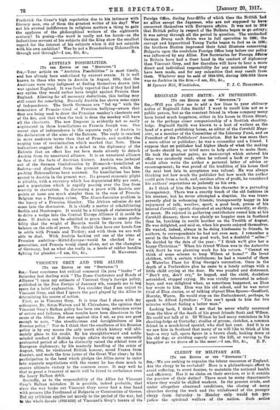REGINALD JOHN SMITH: AN IMPRESSION.
[To TES EDITOR or TES eamereroa."] Sra,—Will you allow me to add a few lines to your obituary notice of Reginald John Smith? I want to recall him not as a, public person, but as the constant friend in whose company many have found much happiness, either in his house in Green Street, or in the perhaps closer companionship of a Scottish shooting- lodge. Reginald Smith was known to a host of writers as the head of a great publishing house, as editor of the Cornhill Maga- zine, as a member of the Committee of the Literary Fund, and ao President of the Publishers' Association. But he was more than a mere editor or publisher; he was a counsellor and a friend. I suppose that no publisher had higher ideals of what the making of books should be, or tried more to help others to make them. He took the greatest pains; no manuscript which entered his office was carelessly read; when he refused a book' or paper he would often write the author a personal letter of advice or encouragement; he was proud of the tradition of his house that the next best fate to acceptance was refusal. He was always thinking not how much the publisher but how much the author could gain from a book, and, careless often of profit, he considered his authors' reputations as jealously as his own.
As I think of him the keynote to his character is a pervading transparency. There was a courtly touch of the old fashions in his manner, but he never attempted a disguise. lie was trans- parently glad in welcoming friends; transparently happy in his enjoyment of talk, weather, sport, a good book, praise of his beloved Cornhill; openly disgusted at anything cowardly, or dirty, or mean. He rejoiced in gathering contributors round him at his Cornhill dinners; there was plainly no happier man in Scotland than he, lunching in sunlit heather on the Twelfth of August. He was delighted, and said so, when his guests enjoyed themselves. He wanted, indeed, always to be doing kindnesses to friends, to authors, to correspondents he had not even seen. I remember a novel in the balance; it was good work, but a doubtful " seller." He decided by the date of the year : "I think we'll give her a happy Christmas." When his friend Wilson was in the Antarctio with Scott he was planning work for his return. " Cannot we think of some scheme to keep Wilson at home? " He loved children, with a certain wistfulness; he had a roomful of them at Waterloo Place for King George's coronation. Once in the depth of a Forfarshire glen he came to a lonely cottage with a little child crying at the door. He was puzzled and distressed. "Don't cry, don't cry," he begged, and the child, doubtless astonished, stopped crying. He was vividly interested in school- boys, and was delighted when, as sometimes happened, an Eton boy wrote to him. Eton was his old school, and he was never tired of Eton stories, or of talking ofgreat Eton figures—Goodford, Hornby, Warre. He would stop on the Embankment, perhaps, to speak to Alfred Lyttelton: "You can't speak to him for two minutes without feeling a better man."
Looking back, I think I see that he never wholly recovered. from the blow of the death of his great friends Scott and Wilson. He could not talk of it. Of Wilson he had many reminders in his shooting-lodge at Cortachy; studies of grouse, sketches, a common friend in a much-loved spaniel, who died last year. And it is as we saw him in Scotland that many of us will like to think of him best—a very tall, spare figure in a brown cloak, looking down at his old dog; or striding eagerly over the hill, or waving to the
bungalow as we drove off to' the moor.—I am, Sir, dc., E. P.


































 Previous page
Previous page